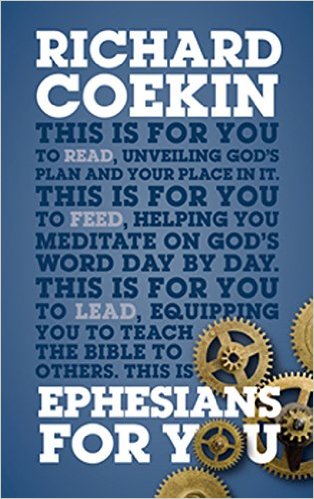This excerpt is adapted from Richard Coekin’s new expository guide Ephesians For You (The Good Book Company, 2015). For a broader discussion of the application of Ephesians to Christians today, see the video in the header, where Richard Coekin dialogues with John Piper and Tim Keller on the topic.
In most Western cultures—with divorce rates rising, marriages rates falling, and more couples cohabiting and having kids without marrying—even the most romantic and glamorous royal wedding can’t obscure the obvious question: is marriage really necessary anymore? And with legal redefinitions now allowing for same-sex marriage in many nations, how should we as Christians conduct our marriages? Part of the answer lies in grasping how the nature of God affects the marriage relationship.
According to Ephesians 5:21–33, our loving Creator has instilled marriage into the instincts of humanity and fabric of human society in order to stir longing and prepare hearts for the love of Christ. Marriage conducted in God’s way is a glorious demonstration to the heavenly realms of the triumph of his plan to gather all things under his Son. Among God’s people marriage is no longer a battleground but a field of victory, where sinners can remain united to each other in the service of Jesus. Indeed, it’s God’s chosen illustration of Christ’s covenant love for his church. So for all of us (whether single, married, divorced, or widowed) this passage not only speaks of the things we can pray for married couples, but also celebrates the intimate union of all believers with Christ—the one to whom we will one day be united in the ultimate “marriage made in heaven.”
There’s a tendency to jump straight to the hot-button issues of headship and submission when considering a passage like Ephesians 5. But in order to grasp God’s guidelines for behavior in marriage, it’s best to first consider his own nature.
Partnership Toward a Shared Goal
Being created in the image of God grounds our human dignity. Contrary to contemporary thinking, we have fundamental value because we are created by and for God. Our identity isn’t rooted, then, in being married or sexually expressive. That’s why Christians celebrate the dignity of childhood and celibate singleness and widowhood, as well as the intimacy of marriage.
And this explains why God designed marriage to be the lifelong union of one man and one woman working toward a shared goal, not toward mere happiness. This means saved sinners who gather together under the rule of Christ in marriage powerfully proclaim the triumphant wisdom of God’s eternal plan. We discover we’re more blessed by serving God together than by making personal satisfaction our governing idol. A husband and wife pursuing the gospel as their goal will grow closer than a husband and wife focused solely on their own happiness.
Marriage Is a Mirror
The doctrine of the Trinity, which Jesus endorsed and Scripture teaches, also profoundly affects Christian marriage. The Father, Son, and Holy Spirit live in a permanent, plural, equal, complementary, ordered, and loving union. And since we’re created like God, we thrive in marriage relationships that mirror his trinitarian union.
- Since God is permanent, he designed us for lasting marriages, not divorce.
- Since God is triune, he designed us for marriages of intimate companionship to counteract loneliness.
- Since God is three equal persons, he designed us for marriages in which husbands and wives are equally dignified.
- Since God is diverse and complementary, he created marriage to be diverse and wonderfully complementary within a heterosexual union, not a homosexual union.
- Since God’s Trinity is ordered (the Son and the Spirit gladly submitting to the Father), he designed all human relationships—including marriage—with authority to be exercised lovingly and submission to be given willingly without any implication of superiority or inferiority.
It is crucial to understand that order does not imply inequality. Indeed, order exists within the Godhead itself. So just as Christ rules over the church while also submitting to his Father (with whom he is equal), we too may have different roles in different relationships. A woman may exercise loving authority over her children or her colleagues—or willingly submit to the authority of her employer, church elders, and husband—and yet remain, in importance and dignity, entirely equal with them all.
Since God himself is a community of loving relationships, his image-bearers are designed for loving marriages. We are to love and be loved—not merely through sentimental affection or sensual desire but through a sustained sacrificial kindness in every season of life. Indeed, our love is to be unconditional, based not on the other’s glamorous looks but on a commitment of exclusive devotion to their present and eternal good.
Try Before You Buy: FREE Sample of TGC’s New Advent Devotional
 Choosing the right Advent daily devotional can be tough when there are so many options. We want to make it easier for you by giving you a FREE sample of TGC’s brand-new Advent devotional today.
Choosing the right Advent daily devotional can be tough when there are so many options. We want to make it easier for you by giving you a FREE sample of TGC’s brand-new Advent devotional today.
Unto Us is designed to help you ponder the many meanings of this season. Written by TGC staff, it offers daily Scripture readings, reflections, and questions to ponder. We’ll send you a free sample of the first five days so you can try it out before purchasing it for yourself or your church.


































